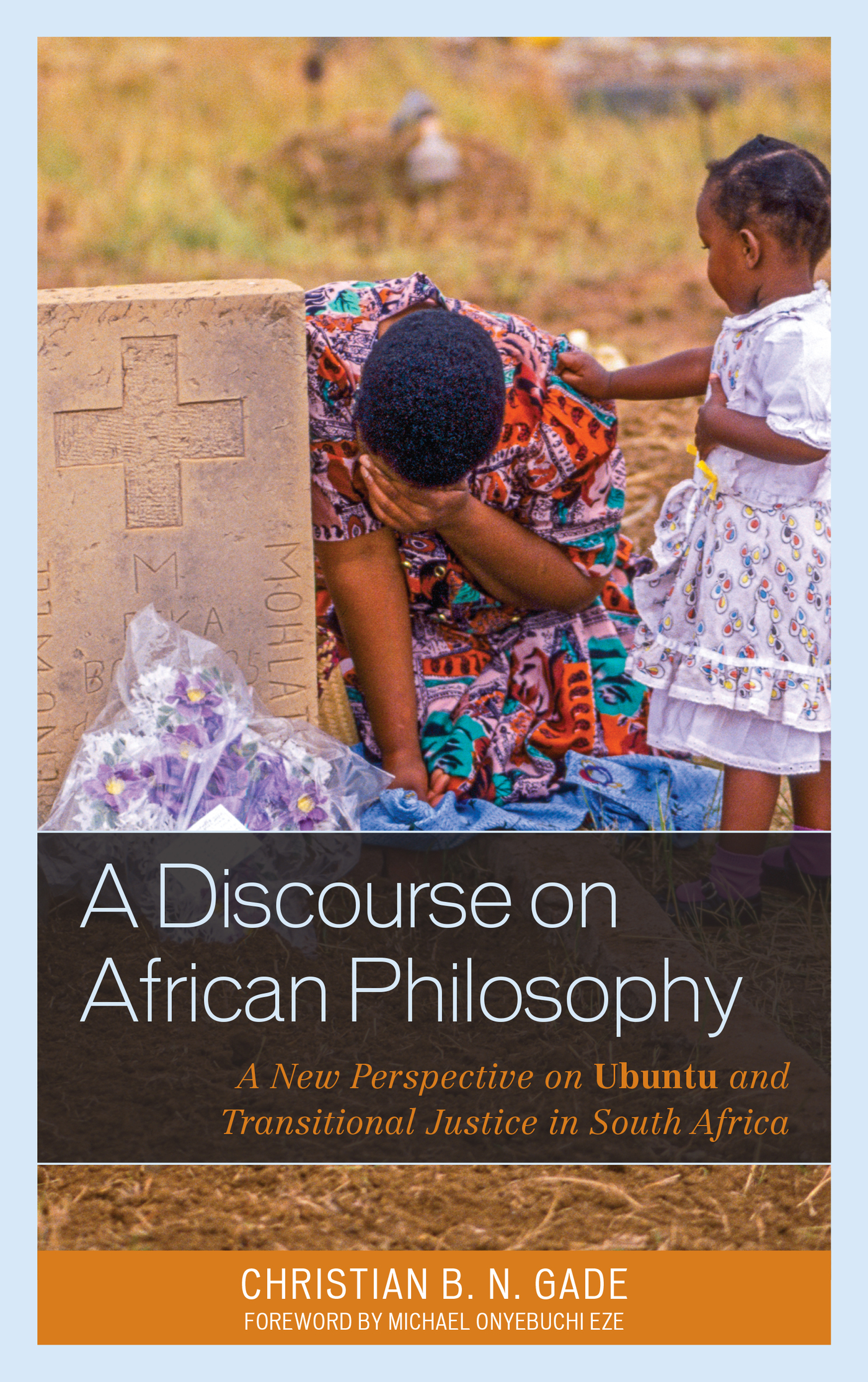A Discourse on African Philosophy
African Philosophy:
Critical Perspectives and Global Dialogue
Series Editor: Uchenna B. Okeja, Rhodes University; and Bruce B. Janz, University of Central Florida
Editorial Board: Anthony Appiah, Valentine Mudimbe, Gail Presbey, Achille Mbembe, Robert Bernasconi, Samuel Imbo, Tsenay Serequeberhan, Thaddeus Metz, Katrin Flikschuh, Niels Weidtmann, Christine Wanjiru Gichure, Kai Kresse, Joseph Agbakoba,
Souleymane Bachir Diagne, Dismas. A. Masolo, Pedro Tabensky
The African Philosophy: Critical Perspectives and Global Dialogue book series aims to promote emerging critical perspectives in different branches of African philosophy. It serves as an avenue for philosophers within and between many African cultures to present new arguments, ask new questions, and begin new dialogues within both specialized communities and with the general public. By merging the critical and global dimensions of thoughts pertaining to important topics in African philosophy, this series beams the lights and rigour of philosophical analysis on topical as well as classical questions reflective of the African and African diaspora search for meaning in existence. Focused on the best of African philosophy, the series will introduce new concepts and new approaches in philosophy both to intellectual communities across Africa, as well as the rest of the world.
Titles in the Series
A Discourse on African Philosophy: A New Perspective on Ubuntu and Transitional Justice in South Africa, by Christian B. N. Gade
Disentangling Consciencism: Essays on Kwame Nkrumah's Philosophy, edited by Martin Odei Ajei
The Rule of Law and Governance in Indigenous Yoruba Society: An Essay in African Philosophy of Law, by John Ayotunde Isola Bewaji
A Discourse on African Philosophy
A New Perspective on Ubuntu and
Transitional Justice in South Africa
Christian B. N. Gade
Foreword by Michael Onyebuchi Eze
LEXINGTON BOOKS
Lanham Boulder New York London
Published by Lexington Books
An imprint of The Rowman & Littlefield Publishing Group, Inc.
4501 Forbes Boulevard, Suite 200, Lanham, Maryland 20706
www.rowman.com
Unit A, Whitacre Mews, 26-34 Stannary Street, London SE11 4AB
Copyright 2017 by Lexington Books
All rights reserved. No part of this book may be reproduced in any form or by any electronic or mechanical means, including information storage and retrieval systems, without written permission from the publisher, except by a reviewer who may quote passages in a review.
British Library Cataloguing in Publication Information Available
Library of Congress Cataloging-in-Publication Data
Names: Gade, Christian B. N., author.
Title: A discourse on African philosophy : a new perspective on Ubuntu and transitional justice in South Africa / Christian B.N. Gade ; foreword by Michael Onyebuchi Eze.
Description: Lanham : Lexington Books, 2017. | Series: African philosophy: critical perspectives and global dialogue | Includes bibliographical references and index.
Identifiers: LCCN 2017002424 (print) | LCCN 2017008465 (ebook) | ISBN 9781498512251 (cloth : alk. paper) | ISBN 9781498512268 (Electronic)
Subjects: LCSH: Ubuntu (Philosophy) | Transitional justice--South Africa. | South Africa. Truth and Reconciliation Commission. | Reconciliation--Political aspects--South Africa.
Classification: LCC B5315.U28 G33 2017 (print) | LCC B5315.U28 (ebook) | DDC 199/.6--dc23 LC record available at https://lccn.loc.gov/2017002424
 TM The paper used in this publication meets the minimum requirements of American National Standard for Information Sciences Permanence of Paper for Printed Library Materials, ANSI/NISO Z39.48-1992.
TM The paper used in this publication meets the minimum requirements of American National Standard for Information Sciences Permanence of Paper for Printed Library Materials, ANSI/NISO Z39.48-1992.
Printed in the United States of America
To my beloved family
The future depends on how we relate to the past
Foreword
Michael Onyebuchi Eze
Christian Gade, in this excellent discourse on African philosophy, offers a new perspective on the role of ubuntu and the Truth and Reconciliation Commission (TRC) in the making of modern South Africa. He does not accept the tendency evident in much of the literature to ignore the role of history and social context in the making of new national culture or political imagination. As so often in times of national reconstruction, cultural enterprises come to be expressive of national character.
Ubuntu was employed by the post-apartheid South African government to construct a new political imagination, one that would displace the old apartheid order. Its creative use in academic discourse has produced a new vision of history in which the past is no longer a location of subjective alienation or exclusion, but a source of sociopolitical and moral unity. Ubuntu has become a prophetic moral national culture in which all South Africans, irrespective of race, find a home. The emotional legitimacy that it evokes accounts both for its arbitrary use and even for its commodification in the TRC and thereafter. Yet precisely because it was not historicized, ubuntu has initiated new points of contestation within the field of African philosophy. In this context, it becomes a magic discourse with an eccentric blend of characteristics:
A retrograde tradition that eschews history and context in favor of cultural essentialism;
An ideological discourse imposed as a conscious imagination with the potential to cure post-apartheid South Africa of all melancholies and anxieties from the past;
Being ideological means also that it is essentially exclusive, drawing its practitioners into an ethno-consciousness reflecting primarily the victors morality and justice;
Without being historicized, ubuntu also reads as a dogma, functioning albeit subjective conversion of historical experiences;
As a system of thought, ubuntu evokes exotic complexities: an epistemic proof for supremacy of African values; a source of validation for African philosophy; a displacement narrative to apartheid discourse; a reactionary discourse or elitist project of professional philosophers.
The challenge here is that if ubuntu does indeed emerge as a displacement narrative, then it cannot authentically claim to be a true African philosophy, for it remains a project of the Other, that is, invented in the colonial gaze. It becomes merely a residual narrative. The African philosopher practicing such discourse is entrapped in what may be termed the colonization of subjectivity. The philosophical enterprise itself only gains essence as a response to Western historical episteme. Seen as a reactionary discourse, ubuntu philosophy is afflicted with the same disease it is hoped to cure, an essentialist rendered discourse possessing all the homogeneous credentials of the old apartheid order without any room for difference or innovation.
Gade is mindful of these limitations as evident in his criticism of the project of African philosophy. Closely following the writing of Paulin Hountondji, Gade criticizes earlier studies in the discipline now termed ethnophilosophy. Hountondji has criticized what he terms ethnophilosophy as nurtured by narratives of historical mystification, unanimity and cultural essentialism:
Our position on this point is materialist: philosophy is above all a cultural fact with an objective social existence, and it must be approached empirically rather than postulated, like the sedative power of opium, as the conclusion of a process of induction.... Ethnophilosophers neglect this plurality, this irreducible polysemy of discourses. They impoverish African literature by reducing all the genres to one and by giving its infinite variety a single metaphysical common denominator.

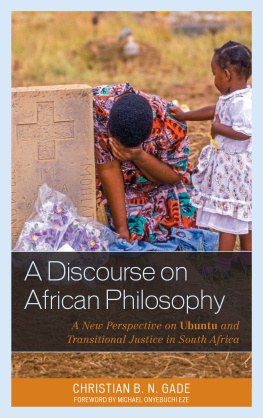
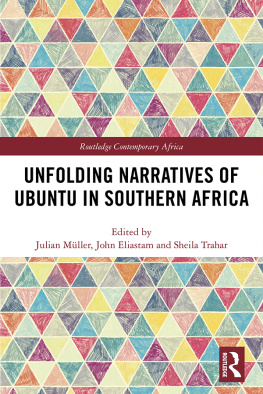
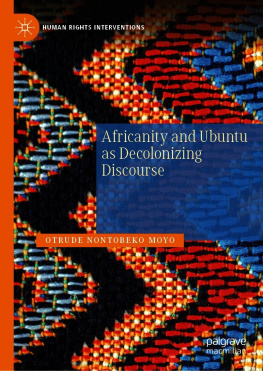
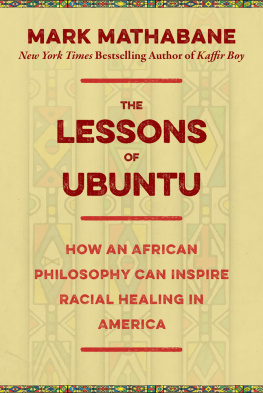
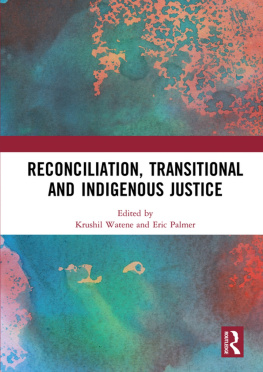



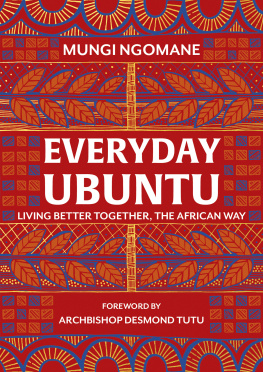


 TM The paper used in this publication meets the minimum requirements of American National Standard for Information Sciences Permanence of Paper for Printed Library Materials, ANSI/NISO Z39.48-1992.
TM The paper used in this publication meets the minimum requirements of American National Standard for Information Sciences Permanence of Paper for Printed Library Materials, ANSI/NISO Z39.48-1992.